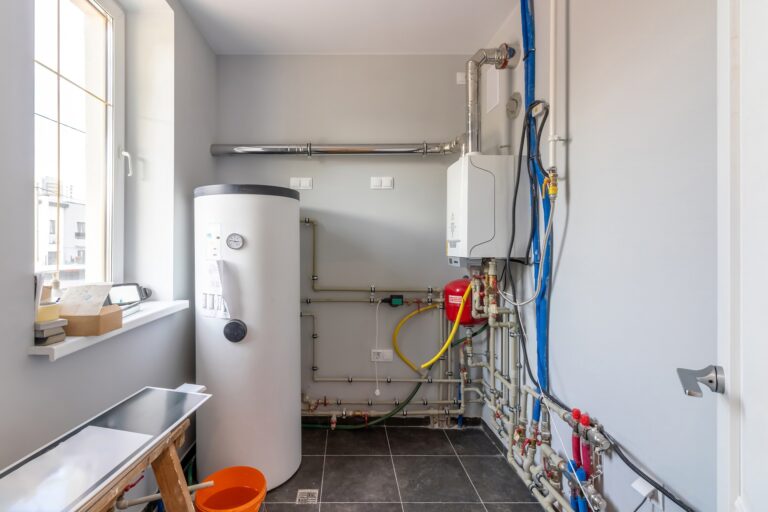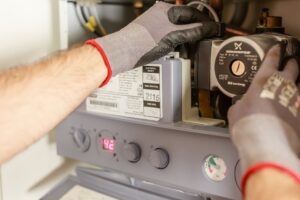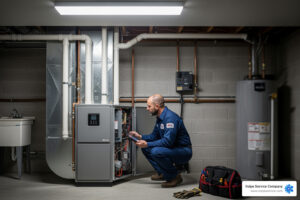A new boiler installation should bring relief—steady heating, consistent performance, and a more comfortable home environment. But when indoor humidity still feels off, you might start to question whether your upgrade actually fixed the problem. Some homeowners in Parsippany are surprised to find persistent condensation on windows, damp spots in rooms, or an overall sticky feeling, even with a recently installed system.
If this sounds familiar, you’re not alone. Even a new boiler can contribute to humidity issues when certain conditions inside the home aren’t addressed. Humidity control involves more than just the heating equipment itself. The structure of the home, ventilation, and system setup all play a role in how your boiler affects comfort and air quality, especially as summer approaches and moisture indoors becomes more noticeable.
Understanding Boiler Humidity Issues
Humidity problems in a home can often be tied to how your boiler interacts with the surrounding environment. While boilers don’t introduce moisture like some humidifiers or older furnaces might, they still impact indoor air indirectly through how they heat and circulate warmth. If the air inside doesn’t move properly or if your home is already retaining moisture, that heat can amplify the feeling of dampness.
During the summer months in Parsippany, this can become more noticeable. Boilers aren’t running as much then, but leftover ventilation problems or system imbalances from the heating season can stick around. A new boiler might be functioning exactly as it should, but if other parts of your home’s setup haven’t been adjusted, persistent humidity problems can follow.
Temperature consistency also matters. If your boiler overheats some rooms while leaving others cooler, moisture tends to linger in corners and underused spaces. This imbalance is often made worse by insulation gaps or poor airflow.
Common Causes Of Persistent Humidity Issues
Even the most advanced boiler system can’t overcome certain building or system challenges. If you’re still dealing with humidity after a new install, a few common issues may be responsible:
1. Inadequate ventilation: If your boiler room or utility area isn’t well-ventilated, moisture can collect and slowly make its way into surrounding rooms. This is a common problem in homes with sealed-off mechanical spaces.
2. Poor insulation: Houses with older or worn-out insulation usually trap more moisture than homes with updated materials. Without proper barriers, outdoor humidity sneaks in and stays there, especially in walls and crawl spaces.
3. Boiler size mismatch: If your new system is too large or too small for your home, it may cycle on and off too frequently or run for too long. Either scenario can lead to uneven heating and extra humidity build-up in certain areas.
When checking for these problems, it’s not always easy to tell what’s affecting your indoor humidity most. For example, someone living in a tightly built home may have reduced airflow, which traps more moisture indoors. An updated boiler might even reveal pre-existing issues that were just masked by an older system’s inefficiency. Recognizing these patterns early can help guide proper adjustments and prevent unnecessary wear on your new system over time.
Signs Your Boiler Might Be Contributing to Humidity Problems
If you’ve ruled out weather and daily habits, it’s worth checking for visible signs that your new boiler may be part of the humidity problem. Even a perfectly functioning system can add to moisture troubles when paired with structural or airflow issues in the home.
Common signs include:
– Condensation on interior windows: This is one of the most obvious red flags. If you notice water droplets forming regularly, especially in rooms near the boiler, it could indicate excess indoor moisture.
– Musty smells: Damp smells inside your home, especially near the boiler area or in closed rooms, often point to trapped humidity. Mold spores thrive in these conditions.
– Wall discoloration or peeling paint: Water vapor can slowly permeate wall surfaces, especially near baseboards or in bathrooms and kitchens, leading to bubbling paint or fading.
– High indoor humidity even when the outdoor air is dry: If your house feels muggy even in drier seasons or during clear weather, this could be caused by poor distribution of air or retained moisture.
– Boiler short-cycling: If the system turns on and off more frequently than expected, it may be oversized. This fluctuating operation doesn’t allow proper air exchange or circulation, making humidity problems worse.
When one or more of these problems show up, they’re rarely isolated. They’re often symptoms connected to a larger issue with airflow, insulation, or equipment sizing. Identifying these patterns early can help prevent costly damage such as mold growth, structural rot, or indoor air quality problems down the line.
How Our Professionals Can Help Fix Humidity Issues at the Source
Dealing with humidity caused by or aggravated by your boiler setup isn’t something that should be ignored. Since so much of it starts behind the scenes, like air ducts, insulation layers, and room vents, it’s difficult to solve without understanding the whole system.
Our professionals look at more than just the boiler. With a full evaluation, they can pinpoint where air is trapped, how moisture is building up, and what mechanical adjustments might help. A few ways our technicians typically address persistent humidity issues include:
– Testing airflow through vents and checking return pathways
– Inspecting insulation coverage around pipes and ductwork
– Adjusting system controls to stop over-cycling during milder temperatures
– Installing supplemental ventilation or fans in closed boiler spaces
– Making layout recommendations for better airflow between rooms
A common example is when moisture starts popping up in a finished basement that’s near a newly installed boiler. Our technicians might find that the humid air stays trapped due to blocked return vents and suggest system balancing or improved fan setups to improve circulation. These kinds of targeted adjustments can offer long-term relief without overhauling the entire system.
Maintaining Proper Humidity with a New Boiler
Once the root cause is addressed, making the right small changes can help the improvements last. Even if your system is tuned properly, the environment inside your home still needs to support humidity control. Here are a few practical tips that can help:
– Use a standalone dehumidifier in high-moisture areas like basements or laundry rooms
– Check window seals and repair any leaks around frames where outside air could be entering
– Avoid over-sealing your home without adding extra ventilation
– Make sure ceiling fans and bathroom exhaust fans work correctly and remove damp air
– Schedule regular boiler checkups, especially after renovations or weather extremes
For homeowners in Parsippany, being aware of both system performance and how your space is behaving is key. Your boiler works alongside all other elements in your home, so taking a layered approach is always the best way to get better results.
Ensuring Long-Term Comfort Through Timely Repairs and Maintenance
Humidity that lingers or returns frequently could signal deeper system issues that haven’t yet been corrected. If left unchecked, these problems can affect more than just comfort. They can lead to costly property damage and increase the stress on home heating systems throughout the year.
One of the best ways to avoid that is by working with technicians who understand what to look for, not just in the boiler itself but how the entire house handles moisture and airflow. With consistent service, adjustments, and seasonal inspections, your new boiler can start doing what it was meant to do: keeping your home warm, efficient, and dry.
Over time, correct sizing, balanced air distribution, and proactive maintenance help build stability in both temperature and humidity. If you’re still experiencing muggy conditions or visible moisture even after upgrading equipment, it’s probably time for a closer look. A professional approach can get to the bottom of what’s really causing the issue and offer real solutions that last.
For a long-lasting solution to your home’s humidity issues, consider expert boiler repair in Parsippany that takes into account airflow, insulation, and system efficiency. Volpe Service Company is equipped to help homeowners achieve better indoor comfort through detailed inspections and personalized repairs. For a quick estimate or to book a service visit, please contact us today.





